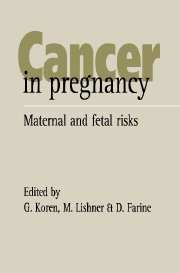Book contents
- Frontmatter
- Contents
- Preface
- List of contributors
- Part I Introduction
- Part II Specific tumors during pregnancy
- 8 Maternal and fetal outcome following breast cancer in pregnancy
- 9 Maternal and fetal outcome following Hodgkin's disease in pregnancy
- 10 Non-Hodgkin's lymphoma and pregnancy
- 11 Maternal and fetal outcome following invasive cervical cancer in pregnancy
- 12 Pregnancy and ovarian cancer
- 13 Malignant melanoma and pregnancy
- 14 Leukemia during pregnancy
- 15 Thyroid cancer and pregnancy
- Part III Fetal effects of cancer and its treatment
- Index
9 - Maternal and fetal outcome following Hodgkin's disease in pregnancy
from Part II - Specific tumors during pregnancy
Published online by Cambridge University Press: 06 July 2010
- Frontmatter
- Contents
- Preface
- List of contributors
- Part I Introduction
- Part II Specific tumors during pregnancy
- 8 Maternal and fetal outcome following breast cancer in pregnancy
- 9 Maternal and fetal outcome following Hodgkin's disease in pregnancy
- 10 Non-Hodgkin's lymphoma and pregnancy
- 11 Maternal and fetal outcome following invasive cervical cancer in pregnancy
- 12 Pregnancy and ovarian cancer
- 13 Malignant melanoma and pregnancy
- 14 Leukemia during pregnancy
- 15 Thyroid cancer and pregnancy
- Part III Fetal effects of cancer and its treatment
- Index
Summary
Introduction
Because the peak incidence of Hodgkin's Disease (HD) is in the age range 20–40 years, its association with pregnancy is not uncommon, occurring in 1:1000–1:6000 deliveries. Early studies reported a higher frequency of relapse and lower survival rates in HD patients who were pregnant. Later publications rejected this conclusion, claiming that pregnancy neither exacerbates the disease nor adversely affects survival. The view that pregnancy does not affect the course of Hodgkin's disease and the disease does not affect the course of pregnancy has become widely accepted and repeatedly stressed in reviews and textbooks. However, this conclusion is based on single cases or a surprisingly small number of uncontrolled studies.
It is unlikely that prospective controlled studies will ever be undertaken to explore further the interaction between HD and pregnancy; therefore, we performed a historical cohort study to evaluate the influence of pregnancy on HD and that of HD on pregnancy among women treated at the Princess Margaret Hospital (PMH) between 1958 and 1984. To the best of our knowledge, this is the only controlled study of HD and pregnancy. In addition, this study is unique in providing information on fetal outcome.
Methods
All patients with histologically confirmed Hodgkin's disease, registered in the Princess Margaret Hospital between 1958 and 1984, were identified.
To study the effects of pregnancy on the course of HD, we matched women having HD in pregnancy having HD in pregnancy to nonpregnant women with the disease.
- Type
- Chapter
- Information
- Cancer in PregnancyMaternal and Fetal Risks, pp. 107 - 115Publisher: Cambridge University PressPrint publication year: 1996
- 4
- Cited by



